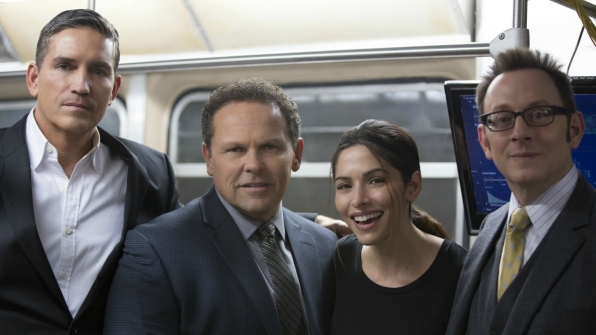Farewell to the Machine: A Look at The Final Season of Person of Interest

Michael Simon ‘19 / Emertainment Monthly Staff Writer
“You’ll never find us, but victim or perpetrator—if your number’s up—we’ll find you.”
Since the science fiction crime drama Person of Interest first aired in September 2011, viewers were greeted every week with this ominous, forewarning monologue from protagonist Harold Finch (Michael Emerson). Any longtime fans of the show could surely tell that the end was near when this once familiar monologue reappeared in a distorted and glitchy way, alternating between the voices of Finch (father of the good Machine) and John Greer (leader of the antagonistic Samaritan). This entire final season focuses on how this war, seemingly between good and bad, actually blurs the lines between our heroes and those they try to stop. It was simple poetic justice that this jumbled voice-over began every episode.

Now, to pick up where Season Four left off, Person of Interest had to hit the ground running. When last we saw our heroes, Finch, Reese (Jim Cavaziel), and Root (Amy Acker) were on the run from Samaritan agents, having contained the core code of the Machine in an indestructible case. Detective Lionel Fusco (Kevin Chapman) saw himself caught in the crosshairs of the shooting of gang lords Dominic and Elias, and Shaw (Sarah Shahi) was still missing in action. As the last season began to take form, the show not only avoided fumbling these many loose ends, but rather thrived with each and every one of them.

Chapman’s Fusco had an especially complete arc this season as his character, who started the show as a dirty cop, found himself doing top-notch detective work after being left in the dark by his partners. Being the only member of the team with a family, it was always deemed as too dangerous to tell Fusco what was going on in this ASI war. However, after the previous finale left him with two gangbangers—one dead and one critical—he was not giving up easily. The mid-season trilogy “QSO,” “Reassortment,” and “Sotto Voce” saw his character resigning from his work with Finch and Reese, only to finally be brought into the fold after it became clear that his safety would always be at risk. The reunion of the five members of Team Machine at the end of “Sotto Voce” was the perfect final case of calm before the storm

As the finals minutes of series finale “Return 0” played out, it cemented itself as one of the most complete and honest conclusions to a show in recent memory. The ASIs took a back seat as the show focused on what it always did best—displaying the importance of the Machine’s human agents. Reese’s and Finch’s death sentences were carried out, as one man met his end and the other was brought back to life. Once the credits rolled, the show had managed to wrap itself up in a way that felt entirely earned and entirely human, as the audience was left with a final lasting idea—an idea that extended beyond the context of the show, creating the perfect mix of morality and hopefulness:
“Sure, everyone dies alone. But if you mean something to someone, if you help someone, or love someone, if even a single person remembers you, then maybe you never really die at all.”
Season Grade: A+